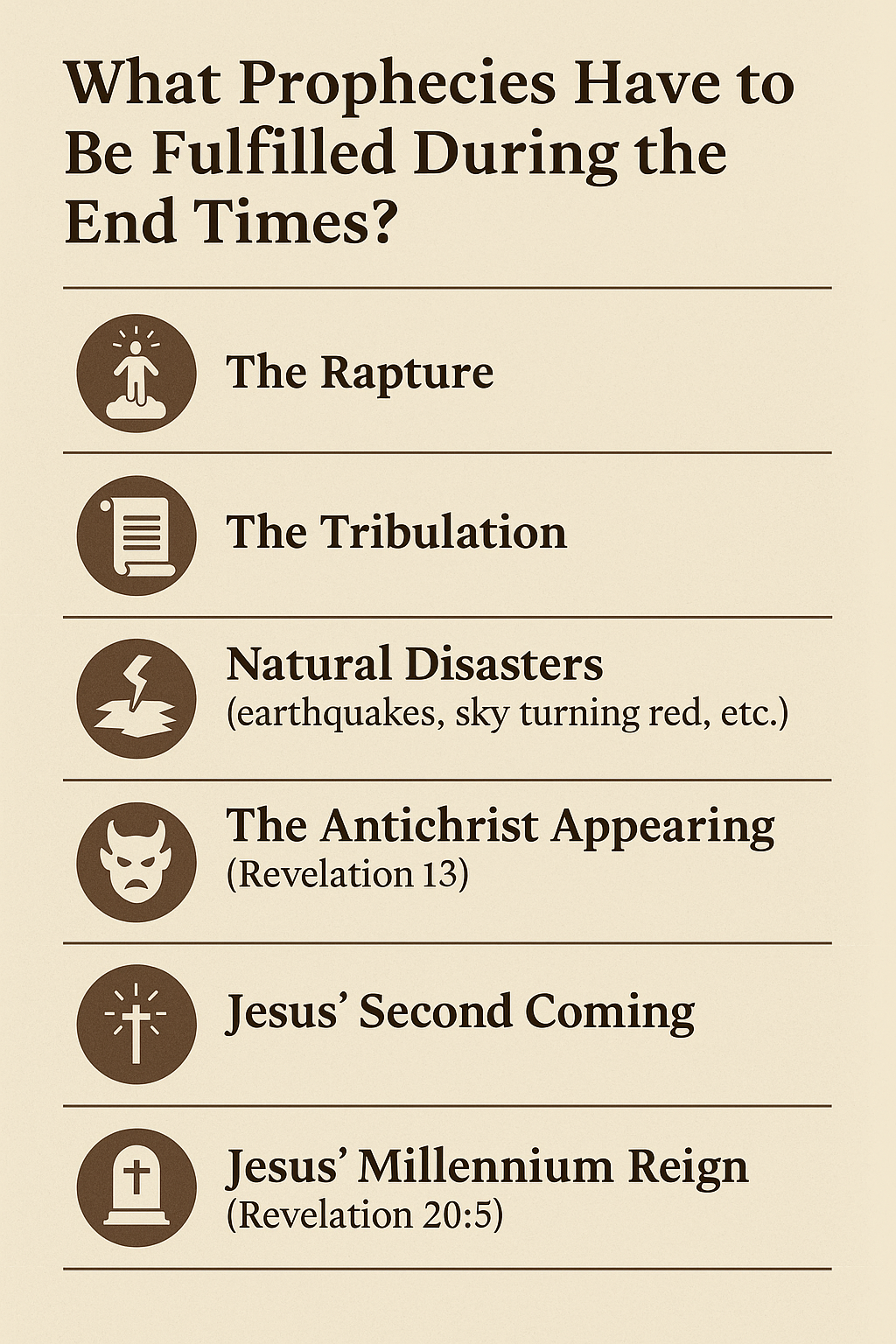Every time people worry about whether the rapture is coming or a major crisis leads them to re-read Revelation, the inevitable question arises: What end-times prophecies should we watch for? How can we know whether a shocking event is something the book of Revelation talks about or business as usual on our complicated planet?
While there are many debates about what end times prophecies must be fulfilled before Jesus returns, Christians have agreed on a handful of prophecies. Let’s take a look at the prophecies that have to be fulfilled before Jesus returns, and which ones will be fulfilled as the end times occur.
What Prophecies Have to Be Fulfilled Before the End Times Start?
Before we get into a list of what end times prophecies must be fulfilled, we must remember that Christians have interpreted Revelation several different ways throughout history. As John J. Collins discusses, Revelation is an apocalyptic text, a genre of ancient literature featuring characters having strange visions (usually about a disaster or coming judgment) which a guide helps them interpret. The Oxford English Dictionary explains that the original Greek word, apokalips, means “unveiling,” and many apocalyptic texts seem written not so much to unveil the world ending as to unveil future judgment against oppressors. For example, the apocalyptic sections of the Book of Daniel may be predictions that the Jews’ oppressors (the Babylonians, Persians, etc.) would eventually be judged for their sins. Like a good science fiction novel about “the future,” an apocalyptic text may talk about the present with colorful symbols to recast how readers see current concerns.
Since many apocalyptic texts seem more about the present than the future, Eugene Peterson and others read Revelation as talking about the early church (oppression under the “antichrist” Nero, God ending persecution in the future), not the world’s end. In contrast, David Jeremiah and others read Revelation as describing the world’s end, its imagery describing prophecies that must be fulfilled.
As detailed in the section below about prophecies to be fulfilled during the end times, even Christians who read Revelation as describing the future have different views on what the last days will look like. However, they tend to agree that three particular prophecies must be fulfilled in order for the end times to begin.
So, assuming Revelation talks about the future, what events in Revelation must happen before the end times begin?
What Prophecies Have to Be Fulfilled before the Rapture Happens?
As the Christian History Institute explains, there are four major views on how to interpret Revelation. Each has different opinions on end times prophecies, but there are essentially only four events that matter to this discussion:
Christians being transported to heaven, also called the rapture (1 Thessalonians 4, 1 Corinthians 15:52)
Great persecution of Christians, also called the tribulation (Revelation 6-8)
Jesus’ second coming to judge sin and defeat evil (Revelation 19)
Jesus reigning for 1,000 years, a millennium reign (Revelation 20)
The most famous view, premillennialism, has two schools (historic and dispensational) that both believe the tribulation will occur before the millennium reign. Dispensationalists believe a rapture will happen first, followed by specific events during the tribulation. Historic premillennialists believe the rapture will happen at Jesus’ second coming, and don’t promote detailed charts showing exactly what will happen during the end times.
Despite their differences, both schools of premillennialism agree that two prophecies must be fulfilled before the rapture occurs:
The Great Commission must be fulfilled (Matthew 24, Acts 3:21)
The city of Jerusalem will become a site for great conflict (Luke 21:20)
Since Jesus said the gospel must be communicated in every language before his second coming, many scholars presume that the Great Commission will not be fulfilled until the Bible is available in every known (or practiced) language. As of this writing, Wycliffe Global Alliance offers an online table showing which languages have a working version of the Bible, and how much work remains to be done.
The reference to Jerusalem being a site for great conflict has been endlessly debated, even before the modern state of Israel was founded in 1948. As Andrew E. Hill explains in an article for Zondervan Academic, the geographic area where the Israelites settled in ancient times was small, but it bridged two continents (Africa and Asia), making it crucial for trade. The Old Testament is full of stories about the Israelites fighting off invaders because whoever controlled this small area of real estate could have incredible economic power. The area also has religious significance because multiple religions (Christianity, Judaism, Islam) claim Jerusalem as a holy site. Therefore, Jesus’ warning that he would return at a time when Jerusalem was filled with conflict is hard to interpret. It’s hard to name a time in ancient or modern history when people have not fought over Jerusalem.
While the Jerusalem element is ambiguous, many scholars would say that we still have a generation or two before the Bible is available in every language and the Great Commission is completely fulfilled. For premillennialists, this means that it is unlikely for the rapture to happen soon. We still have time before the most important end times prophecy is fulfilled.
But premillennialism is not the only interpretation of Revelation. There are two other views: amillennialism and postmillennialism, which have very different ideas about how the end times will play out. What do they believe will happen?
What Has to Happen Before the Millennium Begins?
As articles by Ed Jarrett and Michelle Reyes discuss in more detail, amillennialism and postmillennialism have very different ideas about how to read Revelation.
Amillennialists believe the millennium reign is symbolic, that Jesus’ reign started at Pentecost and lasts until the second coming starts (which could be anytime). Since amillennialists believe the second coming could arrive at any time, they discourage believing in a special tribulation period or a rapture. They would probably say that they believe the tribulation is already happening: being a Christian has always invited struggle. They would also discourage using the word “rapture” because it suggests a special event that is going to happen before Jesus’ second coming: they believe Jesus will transport the faithful to the new heaven and new earth when he returns, not before.
Postmillennialists also discourage believing in a special tribulation or rapture period. They do believe Christians will usher in a golden age of global Christianity, which will last 1,000 years before the second coming occurs. These details mean that postmillennialists have a different take on the Great Commission’s fulfillment than amillennialists and premillennialists. They still believe that Christians should communicate the Bible in every spoken language. However, they believe the result of this good work will be a golden age of global Christianity, not a rapture or tribulation.
In principle, amillennialism and postmillennialism would say that asking “what end times prophecies must be fulfilled before the rapture?” is silly, but agree that the Great Commission must be fulfilled before Jesus returns. They usually do not see Jerusalem as being so critical to the end times, but would probably agree that conflict in Jerusalem will come because the area has always experienced conflict.
Many readers may wonder at this point why the antichrist’s rise or other events mentioned in so many end times sermons have not been mentioned yet. To answer that, we need to look at what prophecies are going to be fulfilled during the end times.
What Prophecies Have to Be Fulfilled During the End Times?
Discussions about what will happen during the end times tend to mention the following events:
The rapture
The tribulation
Disasters, from earthquakes to the sky turning red (Revelation 8-11, Revelation 15-18)
The Antichrist appearing (Revelation 13)
Jesus’ second coming
Jesus’ millennium reign
The final resurrection of the dead (Revelation 20:5)

As stated above, amillennialism and postmillennialism affirm that the second coming and final resurrection will happen, but don’t encourage believing in rapture or tribulation, and read the disasters as symbolic references. Historic premillennialism sees the rapture as occurring at the second coming and that the tribulation will include disasters and perhaps the antichrist, but that the details are fuzzy.
Dispensationalism argues that the end times will start with the rapture and that Christians can produce specific timelines for when certain disasters (the antichrist’s appearance, particular judgments) will happen during the tribulation period. Most readers probably know some version of dispensationalism, and therefore assume events like the antichrist’s rise must occur before the end times start. Most dispensationalists would say those dark events come after the rapture.
This still raises a question: why are we prone to assume there has to be a detailed list of end times prophecies that must be fulfilled before Jesus returns?
Why Do We Assume Many End Times Prophecies Must Be Fulfilled?
The short answer to why many Christians (at least in America) assume there must be a detailed list of end times prophecies that must be fulfilled is that there are many apocalyptic references in the Bible, but it is hard to say which ones are about the end times and which ones are about events that have happened. Again, many scholars would argue that the apocalyptic visions in Daniel are about events that have happened since then (Israel’s oppressors, Babylon and Persia, rising and then falling).
The fact that dispensationalism has been so popular in American Christianity also means that many people attempt to follow its tone. As Amy Johnson Frykholm discusses in her book Rapture Culture, dispensationalism came out of John Darby Nelson’s teachings in the Plymouth Brethren, which were popularized through James Scofield’s Bible commentary, then carried into the fundamentalist movement, and then became highly important to offshoot groups like the evangelical movement. This means that while Catholic Christians in America tend not to believe in the rapture, most conservative Protestants in America have been discussing dispensationalism for nearly two centuries. Therefore, many people assume they are following the right track if they produce detailed prophecy lists of what must happen before the end times start, even though most dispensationalists would not take that approach.
Whether we agree with dispensationalism about specific prophecies being fulfilled during the end times, discussing what will happen before the end times arrive should motivate us to do several things.
How Should End Times Prophecies Motivate Us Today?
Regardless of what form the end times take, we have a couple of things we are called to do before the end arrives. Regardless of which school of interpretation we follow, we all agree as Christians that the Great Commission must be met before Jesus’ return, and that the return will include him judging evil and restoring goodness. In other words, whatever we believe about the end times, we know that we are:
Called to fulfill the Great Commission.
Called to remember that Jesus will make all things right in the end.
We can look for ways to practice these two missions every day. We may fulfill the Great Commission by translating the Bible into other languages, but we should share the gospel with the people we meet, and consider how we are living the gospel out each day, not just speaking it. We may not teach our families all the finer points of dispensationalism, but we should make sure that we teach Revelation’s key message: the story of our lives ends with God making all things new.
As we practice the mission God has given us, we will find that we have a healthier perspective. Crises happen all the time, and we should grieve when bad things occur. However, the fact that we know how the story ends, that God will renew goodness and defeat evil, should give us hope amid crises. It should encourage us to bring healing and redemption into the darkest places. Only once we remember Jesus’ second coming are we motivated to follow Jesus well today.
Photo credit: ©Getty Images/Ig0rZh





.jpg)